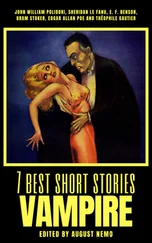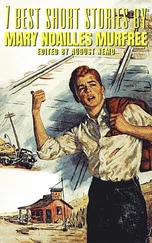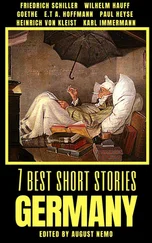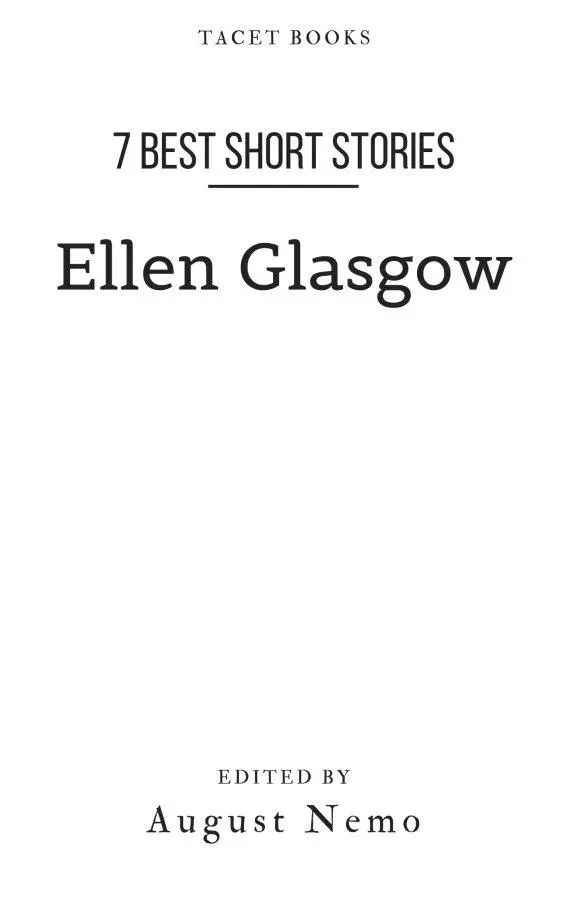
Title Page
The Author
"Evasive Idealism” in Literature
The Shadowy Third
Dare’s Gift
The Past
Whispering Leaves
A Point in Morals
The Difference
Jordan’s End
About the Publisher


Ellen Anderson Gholson Glasgow (April 22, 1873 – November 21, 1945) was an American novelist who won the Pulitzer Prize for the Novel in 1942. A lifelong Virginian who published 20 books including seven novels which sold well (five reaching best-seller lists) as well as gained critical acclaim, Glasgow portrayed the changing world of the contemporary South, differing from the idealistic escapism that characterized Southern literature after Reconstruction.
Born in Richmond, Virginia on April 22, 1874 to Anne Jane Gholson (1831-1893), and her husband Francis Thomas Glasgow, the young Glasgow developed differently from other women of her aristocratic class. Due to poor health (later diagnosed as chronic heart disease), Glasgow was educated at home in Richmond, receiving the equivalent of a high school degree, although she read deeply in philosophy, social and political theory, as well as European and British literature.
Her parents married on July 14, 1853, survived the American Civil War, and would have ten children together, of whom Ellen would be the next to youngest. Her mother, Anne Gholson, was inclined to what was then called "nervous invalidism"; which some attributed to her having borne and cared for ten children. Glasgow also dealt with "nervous invalidism" throughout her life. Ellen Glasgow thought her father self-righteous and unfeeling. However, some of her more admirable characters reflect a Scots-Calvinist background like his and a similar "iron vein of Presbyterianism."
Ellen Glasgow spent many summers at her family's Louisa County, Virginia estate, the historic Jerdone Castle plantation, which her father bought in 1879, and would later use that setting in her writings.
Her paternal great-grandfather, Arthur Glasgow, had emigrated with his brothers in 1776 from Scotland to the then-large and frontier Augusta County, Virginia. Her father, Francis Thomas Glasgow, was raised in what had become Rockbridge County, Virginia, graduated from Washington College (now Washington and Lee University) in 1847, and would eventually manage the Tredegar Iron Works. Those had been bought in 1848 by Glasgow's maternal uncle, Joseph Reid Anderson, who had graduated fourth in his class of 49 from West Point in 1836 and would introduce the labor of skilled and enslaved Africans at the ironworks to accompany skilled white workers. Anderson was a major business and political figure in Richmond, who supported the Confederate States of America, joined the Army of Northern Virginia, and attained the rank of general. However, because the Tredegar Ironworks produced munitions crucial to the Confederate cause, General Robert E. Lee asked General Anderson to return and manage the ironworks rather than lead armies in the field.
Her mother was Anne Jane Gholson (1831-1893), born to William Yates Gholson and Martha Anne Jane Taylor at Needham plantation in Cumberland County, Virginia. Her grandparents were Congressman Thomas Gholson, Jr. and Anne Yates, who descended from Rev. William Yates, the College of William & Mary's fifth president (1761–1764). Gholson was descended from William Randolph, a prominent colonist and land owner in the Commonwealth of Virginia. He and his wife, Mary Isham, were sometimes referred to as the "Adam and Eve" of Virginia.
During more than four decades of literary work, Glasgow published 20 novels, a collection of poems, a book of short stories, and a book of literary criticism. Her first novel, The Descendant (1897) was written in secret and published anonymously when she was 24 years old. She destroyed part of the manuscript after her mother died in 1893. Publication was further delayed because her brother-in-law and intellectual mentor, George McCormack, died the following year. Thus Glasgow completed her novel in 1895. It features an emancipated heroine who seeks passion rather than marriage. Although it was published anonymously, her authorship became well known the following year, when her second novel, Phases of an Inferior Planet (1898), announced on its title page, "by Ellen Glasgow, author of The Descendant."
By the time The Descendant was in print, Glasgow had finished Phases of an Inferior Planet. The novel portrays the demise of a marriage and focuses on "the spirituality of female friendship." Critics found the story to be "sodden with hopelessness all the way though," but "excellently told." Glasgow stated that her third novel, The Voice of People (1900) was an objective view of the poor-white farmer in politics. The hero is a young Southerner who, having a genius for politics, rises above the masses and falls in love with a higher class girl. Her next novel, The Battle-Ground (1902), sold over 21,000 copies in the first two weeks after publication. It depicts the South before and during the Civil War and was hailed as "the first and best realistic treatment of the war from the southern point of view."
Much of her work was influenced by the romantic interests and human relationships that Glasgow developed throughout her life. The Deliverance (1904) and her previous novel, The Battle-Ground, were written during her affair with Gerald B. They "are the only early books in which Glasgow's heroine and hero are united" by the novels' ends. The Deliverance, published in 1904, was the first Glasgow book to garner popular success. The novel portrays a romance built on the dramatic relationship between the hero and the heroine due to traditional class constraints. The hero is an aristocrat turned into a common laborer after the events of the Civil War, and the heroine lacks the aristocratic lineage but obtains aristocratic qualities such as education and refinement. The genuine affection and reconciliation of the romance of the two were attempts by Glasgow to prove that “traditional class consciousness should be inconsequential to love affairs.” The Deliverance criticizes the institution of marriage because Glasgow herself faced social barriers that prevented her from marrying at that time. The Deliverance is notable for offering “a naturalistic treatment of class conflicts” that emerge after Reconstruction, providing realistic views of social changes in Southern literature.
Glasgow's next four novels were written in what she considered her "earlier manner" and received mixed reviews. The Wheel of Life (1906) sold moderately well based on the success of The Descendant. Despite its commercial success, however, reviewers found the book disappointing. Set in New York (the only novel not set in Virginia), the story tells of domestic unhappiness and tangled love affairs. It was unfavorably compared to Edith Wharton's House of Mirth, which was published that same year. Most critics recommended that Glasgow "stick to the South." Glasgow regarded the novel as a failure.
Читать дальше
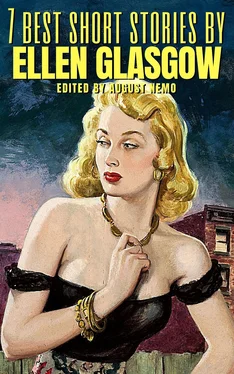





![Коллектив авторов - Best Short Stories [С англо-русским словарем]](/books/26635/kollektiv-avtorov-best-short-stories-s-anglo-thumb.webp)

